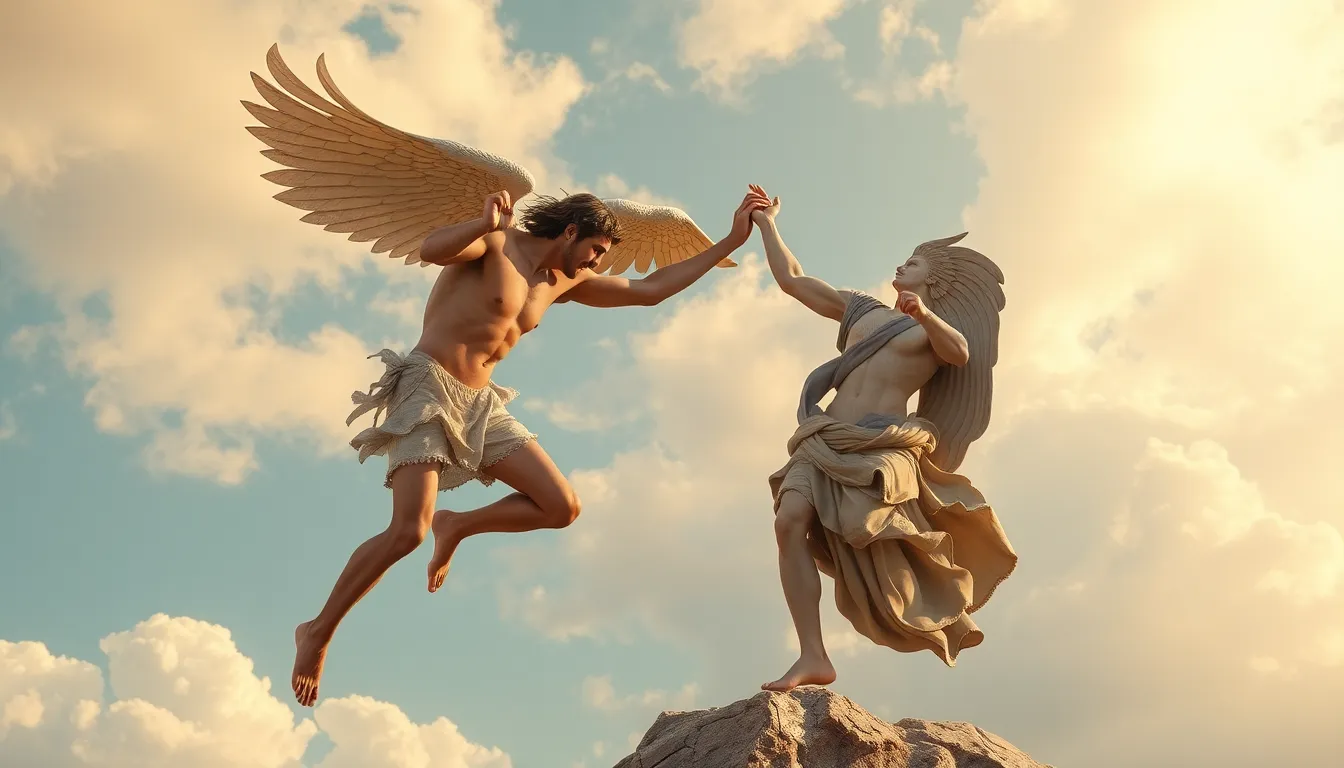The Relationship Between Daedalus and Icarus: A Complex Bond
I. Introduction
The myth of Daedalus and Icarus is a poignant tale from Greek mythology that explores the intricate dynamics between a father and son. Daedalus, a master craftsman, and his son Icarus, embody the tension between ambition and caution, creativity and recklessness. Their story has captivated audiences through the ages, inspiring countless works of literature and art.
This article delves into the complexities of their bond, examining the historical context of their myth, the characterizations of Daedalus and Icarus, the dynamics of their relationship, and the overarching themes that resonate with contemporary readers.
II. Historical Context of the Myth
The origins of the Daedalus and Icarus myth can be traced back to ancient Greece, where they were often associated with the city of Crete and the legendary Minotaur labyrinth. Daedalus, renowned for his ingenuity, was said to have designed the labyrinth to contain the Minotaur, a creature that was half man and half bull.
In ancient Greek culture, Daedalus represented the archetype of the skilled artisan, a figure who combined technical prowess with artistic creativity. The myth’s cultural significance lies in its exploration of themes such as innovation, ambition, and the consequences of defiance against divine or natural laws.
The story of Daedalus and Icarus has evolved over centuries, being adapted by various authors, including Ovid in his “Metamorphoses.” Each adaptation has contributed to the rich tapestry of their narrative, highlighting different aspects of their relationship and the moral lessons that can be drawn from their tragic fate.
III. Daedalus: The Master Craftsman
Daedalus is often depicted as the quintessential master craftsman, known for his extraordinary skills in architecture and sculpture. His most famous achievements include the construction of the labyrinth and the invention of the wings made of feathers and wax that he and Icarus would use to escape from Crete.
- Background: Daedalus was originally from Athens but fled to Crete after committing a crime. His genius was both a blessing and a curse, leading to his entrapment in the labyrinth he created.
- Father and Mentor: As a father, Daedalus sought to protect Icarus and guide him, imparting wisdom and caution that were ultimately disregarded.
- Genius vs. Hubris: Daedalus’s brilliance was often tempered by his hubris, a trait that foreshadowed the tragic outcome of his relationship with Icarus.
IV. Icarus: The Symbol of Youth and Ambition
Icarus, the son of Daedalus, is often seen as a symbol of youthful ambition and the desire for freedom. His character embodies the aspirations of youth, driven by the need to explore and assert independence.
- Characteristics: Icarus is portrayed as adventurous and eager, traits that resonate with the spirit of youth.
- Desire to Fly: His wish to fly represents the universal human desire to transcend limitations and achieve greatness.
- Recklessness: Icarus’s tragic flaw is his inability to heed his father’s warnings, illustrating the archetype of youthful recklessness.
V. The Dynamics of Father-Son Relationships
The relationship between Daedalus and Icarus serves as a lens through which we can explore complex parental dynamics. Daedalus embodies the role of a protective father, while Icarus represents the challenge of independence faced by many youths.
- Parental Expectations: Daedalus’s expectations for Icarus to follow his guidance reflect the pressures many parents place on their children.
- Guidance vs. Independence: The balance between providing guidance and allowing independence is a central theme, as Icarus’s ambition leads him to disregard his father’s advice.
- Motivations for Education: Daedalus’s motives for Icarus’s education stem from both love and a desire to protect him from the dangers of the world.
VI. The Flight: A Turning Point in Their Relationship
The creation of the wings marks a pivotal moment in the relationship between Daedalus and Icarus. The act of flying symbolizes hope and the pursuit of dreams, but it also foreshadows tragedy.
- Significance of Flight: The wings represent human ingenuity and the desire to break free from constraints.
- Metaphorical Implications: The flight serves as a metaphor for ambition and the human spirit, but also for the dangers of overreaching.
- Icarus’s Fall: The moment Icarus falls signifies the tragic consequences of hubris, impacting Daedalus profoundly and altering their relationship forever.
VII. Themes and Lessons from Their Story
The story of Daedalus and Icarus is rich with themes that resonate across time and cultures. Their narrative imparts crucial lessons about ambition, relationships, and the human condition.
- Consequences of Hubris: Icarus’s downfall serves as a warning against the dangers of excessive pride and ambition.
- Fragility of Relationships: The tragedy highlights how easily human relationships can be strained or broken in the face of tragedy.
- Parental Responsibility: The myth raises questions about parental responsibility and the fine line between protection and control.
VIII. Conclusion
The complex bond between Daedalus and Icarus encapsulates the essence of human relationships, marked by love, ambition, and tragedy. Their story serves as a timeless reminder of the delicate balance between guidance and independence, and the consequences that can arise when that balance is disrupted.
As contemporary readers reflect on their tale, they may find enduring relevance in the lessons of ambition, the fragility of relationships, and the responsibilities of parenthood. The myth of Daedalus and Icarus continues to inspire and provoke thought, illustrating the timeless nature of Greek mythology.




